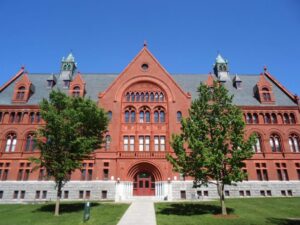Duke University is ivy league – Duke University is an esteemed Ivy League institution that has earned its place among the nation’s most prestigious universities. With a rich history, exceptional academic programs, and a vibrant campus community, Duke stands out as a beacon of higher education. As an Ivy League member, Duke benefits from the collective reputation and advantages that come with this elite group of universities.
Founded in 1838, Duke has evolved into a comprehensive research university with a global reach. Its faculty are renowned for their groundbreaking research and teaching excellence, while its students are drawn from all corners of the world, bringing diverse perspectives and experiences to the classroom.
Definition and Overview of Ivy League: Duke University Is Ivy League

The Ivy League is an athletic conference composed of eight private research universities in the Northeastern United States. The term “Ivy League” is often used to refer to these universities as a group, and their graduates are highly sought after by employers and graduate schools.
The Ivy League was founded in 1954 as a way to regulate athletic competition between the eight schools. However, the term “Ivy League” had been used informally to refer to these schools for many years before that. The name “Ivy League” is thought to have originated from the ivy that grows on the buildings of many of the schools.
Criteria and Characteristics
There are a number of criteria that define an Ivy League institution. These criteria include:
- High academic standards
- A strong commitment to research
- A diverse and talented student body
li>A beautiful and historic campus
The Ivy League schools are all highly selective, and they have some of the lowest acceptance rates in the country. The schools also have some of the highest graduation rates in the country, and their graduates go on to have successful careers in a variety of fields.
List of Ivy League Universities
The eight universities that constitute the Ivy League are:
- Brown University
- Columbia University
- Cornell University
- Dartmouth College
- Harvard University
- University of Pennsylvania
- Princeton University
- Yale University
Duke University’s History and Reputation

Duke University, founded in 1838 as Trinity College, has evolved into a renowned institution of higher learning. Its establishment was driven by the Methodist Episcopal Church, with the aim of providing a comprehensive liberal arts education in the American South.
Over the decades, Duke University has expanded its academic offerings and research capabilities. Today, it is recognized for its excellence in a wide range of disciplines, including medicine, engineering, and the social sciences.
Notable Alumni and Faculty
Duke University has produced a distinguished group of alumni and faculty members who have made significant contributions to various fields. Notable alumni include former U.S. Secretary of State Condoleezza Rice, former U.S. Attorney General Eric Holder, and Nobel laureate Philip Morris. Prominent faculty members have included renowned economist Richard Thaler, sociologist William Julius Wilson, and Pulitzer Prize-winning author Reynolds Price.
Comparison with Other Ivy League Universities
Duke University holds its own among the esteemed institutions of the Ivy League. While each university possesses unique strengths and areas of focus, Duke stands out for its robust academic programs, groundbreaking research endeavors, and diverse student body.
Academic Programs, Duke University is ivy league
Duke’s academic offerings rival those of its Ivy League peers. Its undergraduate curriculum emphasizes interdisciplinary exploration and critical thinking, fostering well-rounded graduates. The university’s graduate and professional schools are consistently ranked among the nation’s best, particularly in fields such as medicine, law, and business.
Research Output
Duke is a research powerhouse, boasting significant contributions to various fields. The university’s research expenditures place it among the top institutions in the United States. Duke researchers have made groundbreaking discoveries in medicine, engineering, and the social sciences, leading to advancements that benefit society.
Student Body
Duke’s student body is highly diverse and intellectually curious. Students come from all corners of the globe, bringing a wide range of perspectives and experiences to campus. The university’s commitment to inclusivity and diversity creates a welcoming and supportive environment for all students.
Strengths and Weaknesses
Duke’s strengths lie in its interdisciplinary approach to education, its cutting-edge research initiatives, and its diverse student body. However, it may face challenges in terms of campus size and a potentially less established reputation compared to some older Ivy League institutions.
Factors Contributing to Duke’s Position
Duke’s position within the Ivy League is attributed to its academic excellence, research prowess, and commitment to diversity. The university’s rise to prominence in recent decades is a testament to its dedication to innovation and its ability to adapt to the changing educational landscape.
Impact of Ivy League Membership

Being a member of the Ivy League confers a range of benefits and advantages on Duke University. These include:
- Enhanced prestige and reputation: Ivy League universities are renowned for their academic excellence, research contributions, and distinguished alumni. Duke’s association with this elite group further elevates its standing and credibility in the academic world and beyond.
- Increased funding and resources: Ivy League universities generally receive substantial funding from alumni, foundations, and government grants. Duke’s membership provides access to these resources, enabling it to invest in research, facilities, and student support.
- Improved recruitment: The Ivy League name carries significant weight in the minds of prospective students and their families. Duke’s affiliation with this prestigious group makes it a more attractive destination for top scholars and researchers, enhancing its ability to recruit talented individuals.
Role in Shaping the Ivy League’s Reputation
Duke University has played an active role in shaping the Ivy League’s reputation as a collective of exceptional academic institutions. Through its contributions to groundbreaking research, innovative teaching methods, and commitment to diversity and inclusion, Duke has helped maintain the League’s high standards and reputation for excellence.
Moreover, Duke’s engagement in inter-Ivy League initiatives, such as collaborative research projects and athletic competitions, has fostered a sense of community and camaraderie among member universities. This collaboration has further strengthened the Ivy League’s collective identity and reinforced its position as a leading force in higher education.
Controversies and Criticisms
Duke University’s Ivy League status has been a subject of debate and controversy. Some argue that Duke does not meet the traditional criteria for Ivy League membership, while others defend its inclusion.
Arguments for Duke’s Inclusion
* Duke has a long and distinguished history of academic excellence, with a strong reputation in both teaching and research.
* The university has a highly selective admissions process, with a low acceptance rate.
* Duke offers a wide range of undergraduate and graduate programs, including many that are ranked among the best in the nation.
* The university has a large and well-funded endowment, which provides support for faculty research, student scholarships, and other academic initiatives.
Arguments Against Duke’s Inclusion
* Duke is a relatively young university, founded in 1838, compared to the other Ivy League institutions, which were all founded before the American Revolution.
* Duke is located in the South, which is not traditionally considered to be part of the Ivy League’s geographic footprint.
* Duke has a more diverse student body than many other Ivy League universities, which some argue dilutes its exclusivity.
Potential Impact of Controversies
The controversies surrounding Duke’s Ivy League status have had a mixed impact on the university’s reputation. On the one hand, some potential students may be drawn to Duke because of its Ivy League affiliation. On the other hand, some critics may argue that Duke’s inclusion in the Ivy League is undeserved, which could damage the university’s reputation. Ultimately, the impact of these controversies is likely to be limited, as Duke’s academic reputation and overall standing remain strong.
Ultimate Conclusion
Duke University’s Ivy League status is a testament to its unwavering commitment to academic excellence and innovation. The university’s contributions to research, teaching, and public service have had a profound impact on society, and its graduates continue to make significant contributions in various fields.
FAQ Corner
Is Duke University considered a top-tier university?
Yes, Duke University is consistently ranked among the top universities in the United States and the world.
What are the benefits of being an Ivy League university?
Ivy League membership brings prestige, increased funding opportunities, and access to a network of influential alumni.
What are the main academic strengths of Duke University?
Duke is particularly renowned for its programs in medicine, law, business, and the sciences.




